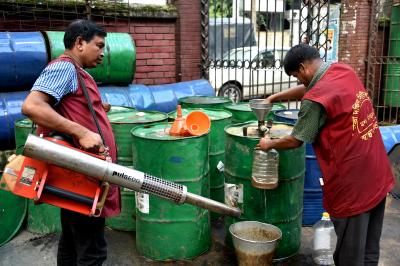Bangladesh: Four more people die of dengue, death toll in 2025 crosses 240
By IANS | Updated: October 15, 2025 19:35 IST2025-10-15T19:31:28+5:302025-10-15T19:35:12+5:30
Dhaka, Oct 15 As many as four dengue patients died in Bangladesh in the 24 hours till Wednesday ...

Bangladesh: Four more people die of dengue, death toll in 2025 crosses 240
Dhaka, Oct 15 As many as four dengue patients died in Bangladesh in the 24 hours till Wednesday morning, increasing the number of fatalities from the mosquito-borne disease in 2025 to 242, local media reported.
During the same period, 758 more patients were admitted to hospital with viral fever, raising the total number of cases to 57,105, according to the Directorate General of Health Services (DGHS). The new fatalities were reported in Dhaka South City Corporation (DSCC) and Barishal division, the United News of Bangladesh (UNB) reported.
Presently, 2,655 patients are receiving treatment at various hospitals in Bangladesh.
As many as 575 people died due to dengue in 2024. During the same period, 101,214 dengue cases and 100,040 recoveries were reported in Bangladesh, according to the DGHS.
On September 16, the DGHS announced new instructions for public hospitals to ensure treatment of dengue patients. According to the guidelines, all hospitals in Bangladesh must establish dedicated wards for dengue treatment and set up a specialised medical team. DGHS Director (Hospitals and Clinics) Abu Hossain Md Mainul Ahsan issued the directive.
The DGHS said hospitals must ensure special arrangements for dengue patients undergoing treatment. The hospitals have been asked to ensure facilities for NS-1 tests, emergency care, and sufficient medicines for patients, leading Bangladeshi daily Dhaka Tribune reported.
Patients undergoing treatment for dengue in hospitals should be kept in a designated ward or room and ICU support must be prioritised when required. Furthermore, doctors and nurses have been given special responsibilities.
The directive called for a creation of a board comprising medicine, pediatrics, and other specialist physicians for the treatment of dengue and Chikungunya patients. Under the supervision of this board, trained doctors, medical officers and residents will provide care to dengue and Chikungunya patients.
According to the directive, the same board and doctors must provide treatment to suspected patients who come to outpatient departments in hospitals.
It also ordered hospital directors to send letters to city corporations or municipalities to conduct mosquito eradication and cleanliness drives around hospital premises. In addition, a dengue coordination meeting must be held at hospitals chaired by the director, superintendent and civil surgeon on every Saturday.
Dengue is a viral infection caused by the dengue virus (DENV), which is transmitted to humans through the bite of infected mosquitoes. Dengue is found in tropical and sub-tropical climates across the world, mostly in urban and semi-urban areas, according to World Health Organisation (WHO) statement. Prevention and control of dengue depend on vector control. There is no specific treatment for dengue, however, early detection and access to proper medical care lower fatality rates of severe dengue.
Disclaimer: This post has been auto-published from an agency feed without any modifications to the text and has not been reviewed by an editor
Open in app